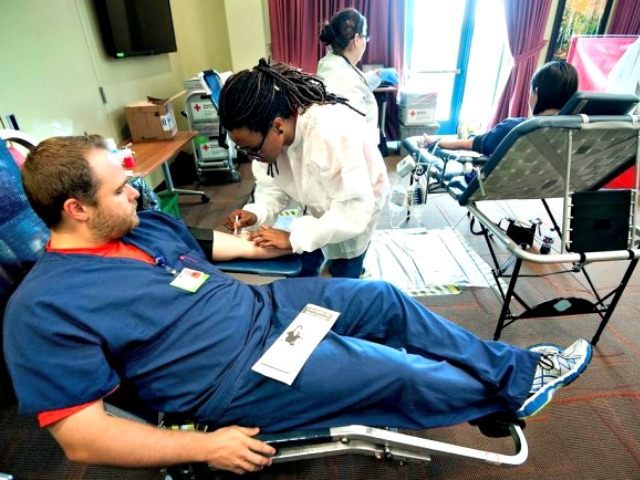WASHINGTON, D.C. — The American Red Cross is relying on “self-deferral” to prevent its blood supply from being infected by the mosquito-borne Zika virus.
“We believe that preventive steps like the implementation of the new self-deferral will help protect the U.S. blood supply from the potential introduction of Zika virus,” Jodi Sheedy, a spokeswoman for the American Red Cross, told Breitbart News via email.
Nevertheless, she warned, “Most people with the Zika virus infection show no symptoms and, therefore, could attempt to donate blood even if they had been infected with the Zika virus.”
An estimated 80 percent of Zika patients are asymptomatic.
On Tuesday, the American Red Cross, a congressionally chartered non-profit, asked prospective donors who have traveled to the outbreak zones, such Latin America and the Caribbean, to wait at least 28 days before giving blood.
“The information that will be provided to donors requesting their self-deferral for 28 days following return from an outbreak area is the best mitigation strategy that we can use currently to prevent collecting blood from potentially infected individuals,” declared Sheedy.
The 28-day period will ensure that the period of infectivity is over, according to the Red Cross.
“This is the time period recommended by the AABB [American Association of Blood Banks], our professional association, and based on the best current scientific evidence,” added the humanitarian institution’s spokeswoman. “While the maximum duration of this virus being present in the blood is unknown, it is believed to be approximately 7 days and thus 28 days provides an adequate safety level.”
“In addition to the new 28-day self-deferral recommended by the AABB, the health history screening also helps to protect the blood supply,” pointed out Sheedy. “Donor screening consists of a temperature check, blood pressure, hemoglobin levels and a series of questions designed to ensure that a donor is healthy enough to donate and that his or her blood is as safe as possible for patients. We only collect blood from donors who are healthy and feeling well at the time of donation”
The disaster relief agency noted that the risk of transmitting the virus through blood donations is “extremely low” in the continental United States.
“It is important to note that due to the absence of local mosquito transmission, the risk of contracting Zika by blood transfusion in the continental U.S. at this time is believed to be extremely low,” Sheedy told Breitbart News.
“In the absence of local mosquito transmission, the number of infected persons is small to absent,” she explained. “The exception is the small number of travelers with Zika infection who have returned to the U.S. from areas experiencing outbreaks like Brazil.”
Donors who have already given blood and have subsequently developed symptoms consistent with Zika are being asked to notify the Red Cross within 14 days so the product can be quarantined.
“At this time, we have not received any calls from donors who are showing symptoms of Zika virus,” notes Sheedy.
“We also provide a call back number if the donor develops any symptoms of disease within the next several days following donation,” she added. “Donations from such donors are not used for transfusion.”
On Thursday, Health officials in Brazil, the most Zika virus-affected country, confirmed two cases of transmission through blood transfusions from donors who had been infected with the virus.
“The two reported cases in Brazil are under investigation and will provide further information regarding the risk of transmission of Zika by blood transfusion,” pointed out the Red Cross spokeswoman.
“Zika is usually contracted via mosquito bites, so transmission of the illness through blood transfusions adds another concern to efforts to contain the outbreak,” reports Reuters. “Some countries have tightened procedures for blood donations, to protect blood supplies.”
Brazil’s Health Ministry has reportedly instructed blood banks that people infected with Zika are not to be permitted to give blood for 30 days after full recovery from the active stage of Zika infection, adds the report.
Canadian Blood Services has reportedly said that “people who travel outside Canada, the continental U.S. and Europe won’t be able to donate blood for 21 days after their return.”
Zika has been linked to the neurological disorder known as microcephaly, which causes babies to be born with abnormally small heads, and Guillain-Barré, a rare syndrome that causes the immune system to damage nerve cells, leading to muscle weakness and even paralysis.
“The Red Cross continues to evaluate all emerging threats in collaboration with the FDA [U.S. Food and Drug Administration] and CDC [U.S. Centers for Disease Control and Prevention] to determine what additional mitigation strategies are needed as the situation evolves,” Sheedy told Breitbart News.
Also causing anxiety is the possibility of Zika transmission through sexual contact. Texas health officials reported on Tuesday that an individual in Dallas contracted the disease after having sex with a person who had traveled to Venezuela, where the virus is also prominent.

COMMENTS
Please let us know if you're having issues with commenting.